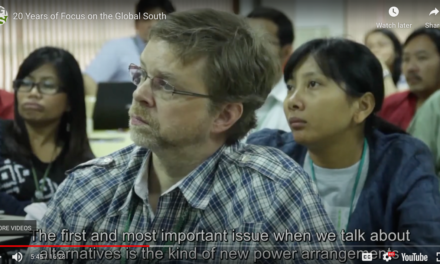STATEMENT OF PHILIPPINE MOVEMENTS ON THE 9TH WTO MINISTERIAL CONFERENCE IN BALI
3 December 2013
The devastation caused by super typhoon Yolanda/Haiyan is considered by many a wakeup call not just to the reality of our vulnerability to extreme weather events that have sadly become the new normal, but also the need to make drastic and radical actions to address climate change; And an imperative to move towards alternative pathways that are more sustainable and equitable.
For the World Trade Organization however things are ‘business as usual’. Starting today until the 6th of December governments will gather in Bali, Indonesia for the WTO’s 9th Ministerial Conference.
Governments and multilateral institutions are strongly pushing for an ‘early harvest’ agreement to come out of Bali. They want faith in the multilateral trading system renewed; they want an expansion of the agenda; and they want the transformation of the WTO into a 21st century institution with higher standards of liberalization, and less talk of development. They want to intensify the corporate agenda with total disregard for the implications of this hyper-globalization on the people and the environment.
We have struggled for more than a decade to put a stop to the Doha Round because it is not in the interest of the Philippines and other developing countries to pursue further economic liberalization. Despite its development rhetoric, Doha was always about opening up markets and never about development.
Throughout its tainted history we have seen the talks collapse, be revived, only to collapse again from the weight of disagreements among countries over the fundamental issue of who should benefit from trade. The contradictions have been more intense in the area of agriculture where asymmetries between rich and poor countries are greatest, and where the divergent interests are more pronounced.
The Bali package that is now desperately being manufactured is yet another manifestation of the true character of the WTO. It is an institution that serves and protect the interests of the strong against the weak. It is an institution that puts the interests of corporations over the interest of people.
We reject the Bali package. We reject an agreement on trade facilitation and the agenda to compel countries to further open up its borders to cheap imported goods. We reject trade facilitation because of the tremendous cost that the new measures would entail for developing countries.
We reject the compromised proposal for a peace clause or an interim solution to the issue raised by developing countries over subsidies to small farmers in the name of food security. We reject the logic of putting a cap on and disciplining support for small farmers for food security in developing countries while the rich countries get away with their huge subsidies to their agriculture. Support for small farmers in developing countries considering their vital role in the production of food, should be guaranteed and not be compromised. The permanent solution is really what small farmers across the globe have been demanding for a long time, for the WTO to get out of agriculture.
It is becoming increasingly clear that the Bali package is a bad deal for developing countries. It is a deal that would force them to open up more sectors including services sectors that are related to customs procedures at a cost that could be too much for their economies; it is a deal that would further compromise their agriculture, their countries food security and the welfare of their small farmers; it is a deal that would further side-track the talks further and further away from any development agenda.
We have witnessed over the years how the agenda of the rich countries have dominated the WTO. Yet developing countries continue to play the game in the hopes that things will change and the talks would turn in their favor. Time and again we have seen the further erosion of special and differential treatment and flexibilities for developing countries, and the side-tracking of their development agenda.
In the wake of the climate catastrophe in the Philippines and its devastating impact on peoples’ lives and livelihoods, the Philippines cannot afford a further onslaught from the WTO and the free trade and investment agenda.
We call for a suspension of all Philippine commitments to the WTO and bilateral and regional free trade and investment agreements to be able to respond to the humanitarian crisis. We strongly urge the Philippine government to take this stand in Bali at the opening of the 9th Ministerial Conference in the name of our suffering people.
Enough is enough.
Aniban ng Manggagawa sa Agrikultura (AMA)
Sentro ng mga Nagkakaisa at Progresibong Manggagawa SENTRO
Pambansang Koalisyon ng mga Samahan sa Kanayunan (PKSK)
World March of Women-Pilipinas (WMW)
Coalition Against Trafficking in Women-Asia Pacific (CATWAP)
Tambuyog Development Center
Focus on the Global South
Freedom from Debt Coalition (FDC)
WomanHealth Philippines
KAMP (Campaign for a life of dignity for all)
Center for Migrant Advocacy (CMA)
Pambansang Koalisyon ng mga Kababaihan sa Kanayunan (PKKK)
IRDF
PKMP







